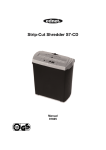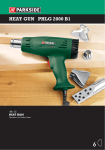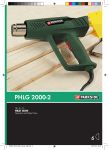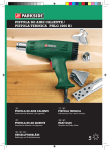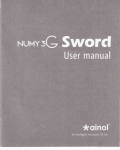Download Kompernass Parkside PHLG 2000 SE Operation and Safety Notes
Transcript
PHLG 2000 SE Operation and Safety Notes Operation and Safety Notes............................................................................................... Page 5 R Q E W e A f B g C h D Kompernaß GmbH Burgstraße 21 · D-44867 Bochum (Germany) Last Information Update: 08 / 2006 · Ident.-No.: PHLG2000SE - 082006-1 / UK / IE Table of Content Before reading, unfold the page containing the illustrations and familiarise yourself with all functions of the device. The following icons / symbols are used in this instruction manual: Read instruction manual! Observe caution and safety notes! V~ W Voltage Watt (performance) Caution – electric shock! Dangerous electric current – danger to life! Wear protective gloves and safety goggles. Risk of fire! Protection category II power tool; double insulated Risk of explosion! Proper procedure and handling. Introduction For your safety......................................................................................................Page Proper use............................................................................................................Page Features and equipment.......................................................................................Page Included items / supplied accessories....................................................................Page Technical information............................................................................................Page 6 6 6 6 6 Safety Safety Information Specific to this Device.............................................................Page 6 Operation Preparing the device for use.................................................................................Page Advice on use.......................................................................................................Page Changing the nozzle..............................................................................................Page Further examples of uses in the house, car and garden........................................Page 7 8 8 8 Cleaning. ................................................................................................................Page 9 Disposal..................................................................................................................Page 9 Information Service.................................................................................................................Page 9 Declaration of conformity /Producer......................................................................Page 9 GB/IE 5 Introduction / Safety Hot air gun PHLG 2000 SE For removing, reshaping, preheating, defrosting etc. L Introduction L For your safety Please make sure you familiarise yourself fully with the way the device works before you use it for the first time and that you understand how to handle electrical power tools correctly. Further details can be found in the operating instructions. Keep these instructions in a safe place. If you pass the device on to anyone else, please ensure that you also pass on all the documentation. L Proper use The hot air gun is intended for the removal of paint, for warming (e.g. heat-shrinkable sleeves) and for reshaping and welding of plastics. It may also be used for detaching glued connections and for defrosting or thawing water pipes. It is not suitable for defrosting pipes made from PVC or similar materials. Any other use or modification to the device shall be considered as improper use and could give rise to considerable dangers. The manufacturer will not accept liability for loss or damage arising from improper use. The device is not intended for commercial use. L Features and equipment Q Air inlet WON / OFF switch E Nozzle R Heat shield T Reflector nozzle Y Protector nozzle U Flat nozzle I Reducer nozzle 6 GB/IE LIncluded items / supplied accessories 1 Hot air gun PHLG 2000 SE 1 Reflector nozzle 1 Protector nozzle 1 Flat nozzle 1 Reducer nozzle 1 Operating instructions 1 Guarantee documentation L Technical information Nominal voltage: 230 V ~ 50 Hz Power consumption:Setting 1: 1000 W Setting 2: 2000 W Air flow approx.:Setting 1: 300 l / min, Setting 2: 500 l / min Temperature Nozzle outlet approx.:Setting 1: 375°C, Setting 2: 550°C Protection class: II / & Sound pressure level: 70 dB (A) The sound pressure level (A) of the device is typically less than 70 dB (A). L Safety Safety Information Specific to this Device JPlease ensure that only individuals over the age of 16 use the device in accordance with the operating instructions! J Please keep children away from the device. Store the device in a dry, closed room to which children do not have access. Safety / Operation Avoid the danger of death by electric shock: J You should check the condition of the device, mains lead and mains plug at regular intervals. Devices with damaged parts must not be used. The device should never be opened. Damaged devices, mains leads or mains plugs may cause death by electric shock. Repair or replacement work should only be carried out by the service centre or a qualified electrician. JDo not touch the mains lead if it becomes damaged or cut through while you are using the device. Pull the plug out of the mains socket immediately and have the device repaired by a suitably qualified person or at your service centre. J Do not operate the device if it is damp and do not use it in a damp environment. JIf you use the device outdoors, always connect it through a residual current device with a maximum trip current of 30 mA. If using an extension lead always use one that is approved for outdoor use. JAlways work with the mains lead leading away from the rear of the device. To avoid the danger of injury, burning and dangers to your health: J Never use the device as a hairdryer. JDo not direct the hot air flow at persons or animals. J Do not look directly into the opening of the hot air nozzle E. J Danger of burns! Do not touch the hot nozzle. Wear protective gloves. J Wear protective glasses. JIn addition, you should never leave the device working unattended. J Bear in mind the high rate of heat generation. If the device is not used carefully, it can give rise to increased risk of fire or explosion. JDo not work in the vicinity of easily ignitable gases or materials. Heating of plastics, paints, varnishes etc. can lead to the creation of gases that are hazardous to health. Make sure you always have adequate ventilation. JLet the device cool down completely before you put it into storage. Always place your heat gun down on its end, with the nozzle pointing upwards (see Fig. D). Handling the device correctly: JIf danger arises, pull the mains plug immediately out of the mains socket. JNever use the device for a purpose for which it was not intended. JWhen taking a break from your work, before carrying out any tasks on the device itself (e.g. changing the nozzle) or when you are not using the device, always pull the mains plug out of the mains socket. JDo not direct the device at the same spot for too long a period. JDo not hold the nozzle outlet too close to the workpiece or the surface on which you are working. If the airflow is constricted it can lead to overheating of the device. J Always keep the device clean, dry and free of oil or grease. JBe aware of areas other than the one you are directly working on. The heat can reach inflammable materials that may be outside your field of view. JRemain alert at all times! Always watch what you are doing and proceed with caution. Do not use the device if you cannot concentrate or you are feeling unwell. L Operation L Preparing the device for use The mains voltage at the mains socket must match that shown on the rating plate on the device. Devices marked with 230 V can also be operated at 220 V. GB/IE 7 Operation Caution! When using the device, never allow the ventilation slots to be covered. Switching on the device: j Press the ON / OFF switch W into setting „I“ or „II“. Switching off the device: j Press the ON / OFF switch W into setting „0“. Setting the air flow and temperature: j The ON / OFF switch W has two different air flow settings. You can select the combination of air flow and temperature most suitable for your task. Setting I Setting II L 300 l / min 500 l / min 375 °C 550 °C Advice on use Removing the heat shield R : j Remove the heat shield R for working in particularly narrow spaces. Caution! Danger of burns! Do not touch the hot nozzle. When you are working without the heat shield R there is an increased risk of burns. The device must be completely cool before you remove or replace the heat shield. jTurn the heat shield R anticlockwise to remove it. jTurn the heat shield R clockwise to put it back on. Use as free-standing unit / during cooling (see Fig. A, D): j Always set the device down upright on a level surface, this will allow · you to have both hands free · the device to cool L Changing the nozzle Reflector nozzle T – for shaping plastic pipes or tubes: j Fill the pipe or tube with sand and ensure it is closed at both ends. This will prevent the pipe or tube from kinking. Warm the pipe or tube evenly by moving the hot air gun from side to side and backwards and forwards. Protector nozzle Y – for removing paint and varnish: j The spatula shape of the nozzle ensures the air is properly directed. Use a separate spatula for removing paint or varnish. Flat nozzle U – for detaching glues, softening paint: jDo not apply heat for too long a period, as burnt paint becomes much more difficult to remove. Many glues can be softened by warming. Glued connections can then be detached and excess glue removed. Danger! Do not inhale any vapours given off. Reducing nozzle I – for welding plastic: j Use the reducing nozzle I for heat-shrinkable sleeves and film. LFurther examples of uses in the house, car and garden Defrosting water pipes: Caution! It must not be used for thawing PVC pipes. Caution! It is often very difficult to tell the difference between gas pipes and water pipes. If in doubt, ask a competent person. Caution! Copper pipes are joined using tin solder and must not be heated above 200°C. j Use the reflector T to defrost water pipes. Loosening a threaded connection: j Heating the threaded connection carefully can often allow the connection to be released. 8 GB/IE Operation / Cleaning / Disposal / Information Removing weeds: j The hot air dries out the weeds and micro-organisms. Lighting barbecue charcoal: j Charcoal ignites in a few minutes. Wax removal: j You can remove wax residues from skis / snowboard or from candle holders. Use the amount of care appropriate to the product. L Cleaning jBefore carrying out any tasks on the device itself, pull the plug from the mains socket. j Keep the air inlet and outlet clean. jUse a cloth to clean the housing. Use a soft cloth to clean the housing. Never use petrol, solvents or cleaning agents as these may attack the plastic. L Disposal The packaging consists of environmentallyfriendly materials. It can be disposed of at your local recycling facility. D o not dispose of electric tools in the household waste! In accordance with European Directive 2002 / 96 / EC relating to old electrical and electronic appliances and its translation into national law, used electric tools must be collected separately and recycled in an ecologically desirable way. Please contact your local council office to find out about disposal facilities for your worn-out electrical tools. L Information L Service Details of the Service Centre responsible for your region are shown in the warranty documents. L D eclaration of conformity / Producer We, Kompernaß GmbH, Burgstr. 21, D-44867 Bochum, Germany, hereby declare that this product complies with the following EU directives: EU Low Voltage Directive (73 / 23 / EEC): EN 60335-1:2002+A1+A11 EN 60335-2-45:2002 EN 50366:2003 Electromagnetic Compatibility (89 / 336 / EEC): EN 55014-1:2000+A1+A2 EN 55014-2:1997+A1 EN 61000-3-2:2000 EN 61000-3-3:1995+A1 Device Type / Designation: Hot air gun PHLG 2000 SE Bochum, 31.08.2006 Hans Kompernaß - Managing Director - We reserve the right to make technical modifications in the course of further development. GB/IE 9 10 11 12










